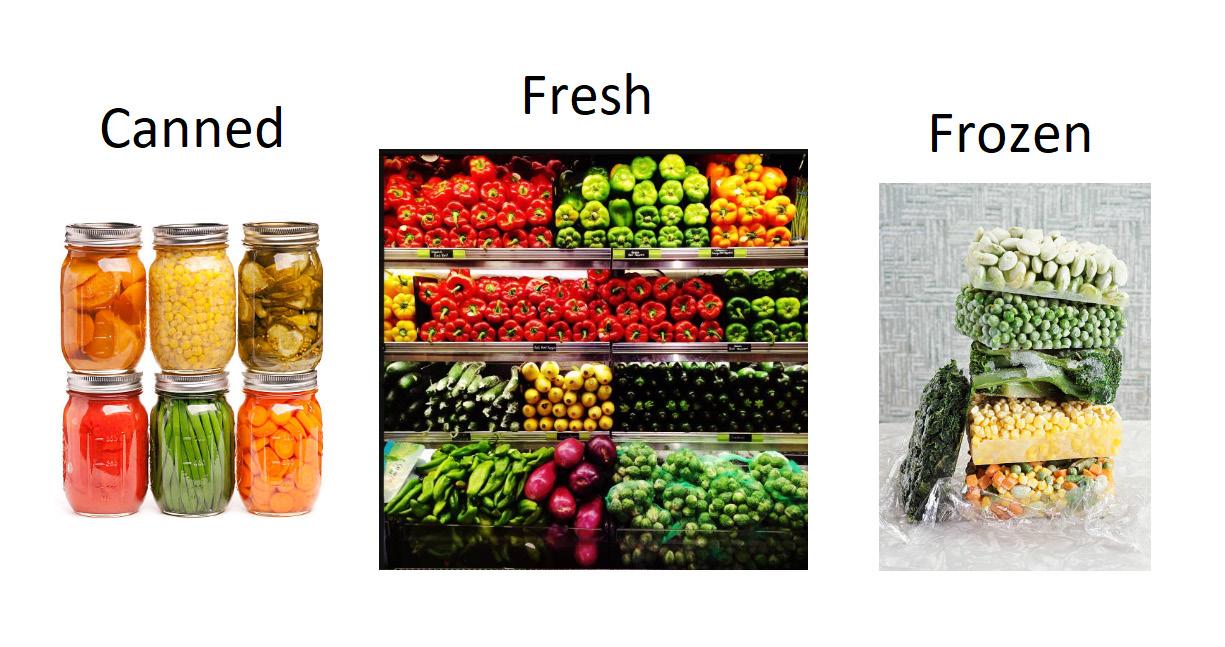
4 minute read
Health and Wellness - Frozen vs Fresh Vs Canned

Health &Wellness
Advertisement
Canned VS FreshVS Frozen Produce
Is there anything better than the fresh produce from your backyard garden or the local market? In Saint Lucia, we import most of the food that we eat. This means that we do not plant enough food to sustain the demand on the island. Sometimes we need to purchase canned foods or frozen foods to sustain our diet.
We all know that fresh produce is the best, but there are instances when we must improvise. We may choose frozen and canned foods when:
• The produce is out of season.
• The produce has been stored for an extended period of time.
• The produce has travelled long distances to get to the food market.
•The produce is not available in your region.
You may have noticed instances when you have stored food in your refrigerator, and after a few days, the produce starts to spoil. Why does this happen?
Canned and Frozen foods get a bad rapport often but is the rating fair? You may be surprised, but weighing your options on its merit can help you eat healthier and cause you to save more money.
Let’s breakdown the differences between fresh, frozen and canned foods to figure out which is the better choice and under what circumstances.
The hours’ count Is your produce fresh?
Let’s clear the air. Eating produce harvested short distances away and eaten briefly after the journey is not bad at all. The question you
should ask is how many miles did it take for the food to get to you. The produced claimed “fresh” at your local supermarket may not be as fresh as you think. The journey can take days, weeks or even months to reach the supermarket shelves.
Most “fresh” fruits and vegetables are picked before they are ripe to allow them time to ripen and develop their nutrients during transportation. This sounds like promising news, but during transport, the produce is stored in a controlled environment, matured artificially and chemically treated to prevent spoilage. This process makes the “fresh foods” less nutritious than naturally ripened fruit and vegetables.
Know your seasons
Certain foods grow at certain times of the year. For example, tomatoes are produced for a limited season in certain parts of the world, such as Australia and the USA. canned tomatoes are an excellent choice in these parts of the world in the offseason. When purchasing produce at the local supermarket, it is a good practice to ensure that it is in season, to guarantee freshness.
Fresh produce can lose half of its vitamins and phytonutrients during storage and cooking. The longer your produce stays in the fridge, the more vital nutrients it loses. It is better to consume fresh produce straight away after pur
chasing the produce. A 3- 4-day time frame may be as close as you would want to store food in the fridge to minimise food waste.
Frozen facts
Frozen produce has received bad reviews because of the idea that is highly processed such as pizzas & pies. Fruits and vegetables are frozen at the time of harvest to temperatures below 0° C in minutes. Since the food is frozen soon after picking, most of the vitamins, mineral content and dietary fibre are locked in with minimal processing. Freezing foods allow persons to consume fruits and vegetables that are out of season and unavailable in their region. These foods can be stored for months but are limited. Vegetables should be consumed within eight months of purchase, and frozen fruits should be consumed between four to twelve months of purchase, depending on the fruit.
Advertently, frozen vegetables are submerged into boiling water to kill bacteria in a process called blanching. This process can affect water-soluble vitamins B and C and preservatives can be added to prevent the foods from expiring too early. Choose organic and BPA-free canned foods whenever possible. Studies have found that BPA (bisphenol A) is linked to severe cardiovascular problems, diabetes and other health issues. A good rule of
thumb is to limit the number of frozen foods you consume.
Canned Foods
Canned foods have their benefits like their counterparts; they are convenient, affordable and reduce wastage of food because of their longer shelf life. Canned foods like frozen foods are harvested at their peak, which means nutrients are secured in and is similar in terms of their nutritional value. In some cases, the nutrient content of some vegetables are enhanced by the canning process — the beta-carotene found in pumpkin and carrots, lycopene, a carotenoid. found in tomatoes may help prevent prostate and breast cancer are examples.
The downside to canned foods is that they tend to be more processed than frozen foods. canned produce is usually cooked as part of the process, so that would mean the food would be lower in vitamins. When buying canned produce, it’s essential to read the label and watch out for hidden salts and sugars. Most canned foods contain extra salt to help preserve them for more extended periods. Therefore buy canned foods with labels such as “no salt added” or “low sodium”. If this isn’t an option, try rinsing canned foods before cooking them. Unfortunately, rinsing can also cause other valuable nutrients to be washed away. Similarly, canned fruits can be very

high in sugar, therefore lookout for tins that are labelled “no sugar added”, “unsweetened” or “packed in its own juices”.
Preparation
Regardless of whether the produce is fresh, frozen or canned, the way you cook fruit and vegetables also have an immense effect on their nutrient content, irrespective of the freshness. Try to avoid cooking vegetables in boiling water for long periods since essential vitamins and minerals tend to leach out into the water. Lightly steam them instead to maximise their nutrients. Fresh produce, recently picked, is always the best option for your food. However, as mentioned before, in some instances, frozen and canned produce, when used correctly, can be nutritious options. Be sure to check the labels on the food you purchased. Nothing beats a fresh fruit out of the garden. If you are unable to grow your own food or can’t find fresh foods to your liking, then consider frozen and canned alternatives.



